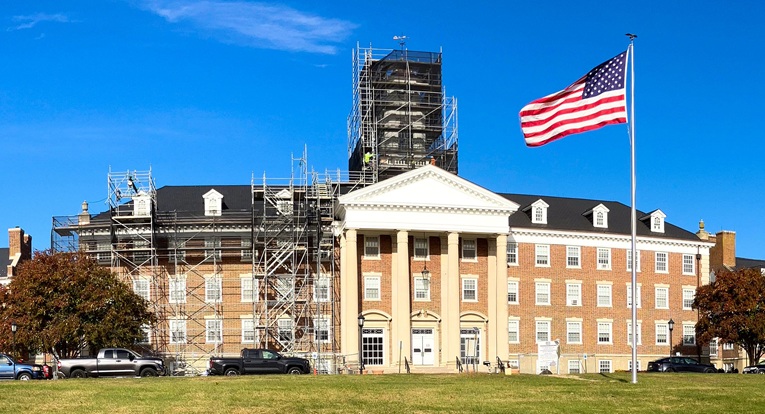After a broad-ranging discussion at its March 14 meeting, the Greenbelt City Council unanimously approved allocating another $200,000 of its American Rescue Plan Act (ARPA) funds for rental assistance and approved the concept of the plan put forward by Greenbelt CARES to help residents move past the need for such assistance. Council also made several appointments to city advisory boards and discussed the reopening of city buildings.
Rental Assistance
Acting City Manager Timothy George reported that staff has noticed that the nature of the requests for aid had changed and that most are now from people requesting help on a monthly basis, which was not the original purpose of the program. Staff is now proposing a program to help residents move beyond the need for assistance.
CARES Director Elizabeth Park reported that, including the earlier ARPA funding, the city has spent $1.5 million on rental/utility/food assistance. Thirty percent of those seeking assistance were unemployed and another 10 percent had family members who were unemployed. The main reason that aid requests were denied was that those seeking help had income over the program limits. In some of these cases, the Greenbelt Interfaith Leadership Alliance (GILA) was able to provide assistance. The money allocated for rental assistance has now been exhausted.
The city has not received as many requests for mortgage or homeowner’s association/condo fee assistance as expected. Park proposed shifting most of the $200,000 remaining in that account to rental assistance, for which Park says they now have applications for $100,000.
Several councilmembers had concerns about this proposal. Mayor Emmett Jordan and Councilmember Silke Pope suspected that court delays and residents’ lack of awareness about the program have delayed the requests, while Councilmember Rodney Roberts felt more money was needed. (He proposed allocating $1 million for this purpose but his motion was not seconded.)
The rental assistance program is but one piece of the ARPA spending pie. George reported that between staff and the online survey, he has received roughly $60 million in requests for the city’s $22.88 million ARPA grant. The city is currently gathering residents’ ideas on needs and priorities. In addition, he said that Treasurer Bertha Gaymon, using a federal formula, has calculated that the city lost $3.4 million in revenue due to the pandemic, which ARPA funds can be used to replace. While city real estate values have held steady or even increased, the hotel/motel taxes dropped $800,000 per year. There was also significant revenue lost from recreation program fees. George expected to get back to council in mid-May with the results of the community engagement.
In the end, council agreed to leave the mortgage assistance funding in place and allocated another $200,000 in ARPA funds for rental assistance.
Councilmembers Rodney Roberts and Colin Byrd both indicated a desire to allocate more money to rental assistance and the issue may be revisited at the next council meeting.
CARES Plan
Park and her staff have developed a multi-phase plan for workforce development and helping residents find jobs. She reported that the city recently received its previously approved Community Development Block Grant for financial literacy training. In addition, they are already offering training on résumé preparation and job search skills for residents 18 to 24 years old. They plan to look at how best to expand this training for those over age 24.
In the first phase of their plan, CARES would work to connect residents with local employment opportunities including posting local and city job openings on the city’s website and hosting a job fair. Case managers will meet with individual residents to assess needs and identify available resources to assist with those needs. CARES will also offer career readiness classes.
In the intermediate term, the plan expands to work with local businesses to identify workforce needs, coordinate workshops and training and discuss specific workforce challenges and possible solutions/resources. In addition, CARES would pilot a youth work readiness program for residents, also 18 to 24 years old.
In the longer term, CARES would offer programming to help connect residents with county and state workforce development organizations. The goal is to promote job training programs and establish a grant-funded program for businesses to customize training programs to attract new employees and increase the skills of their existing workforce, and to encourage businesses to hire locally.
Council approved the concept of the CARES plan, but directed Park to flesh out the plan with projected needs and costs for council review.
Re-opening
On March 21, city facilities were unlocked. However, after a security review, access to those buildings will change. Community Center users will no longer have to do temperature self-check and answer screening questions.
At the Municipal Building, residents entering the building will use a touchscreen to indicate which department they want to visit, then have a video conference to confirm whom they need to see. A staffer will then escort the visitor to their office. Elevator use will require a passcard, which the escort will swipe. Michael Hartman asked how the visually impaired would access city staff. George said he would check with staff regarding access for both visually-impaired and hearing-impaired individuals, who would likely have issues with the video call.
City Boards
Under the consent agenda, council appointed Barbara Stevens to the Arts Advisory Board and reappointed Matthew Inzeo and Tom LeaMond to the Advisory Planning Board and the Arts Advisory Board, respectively.



